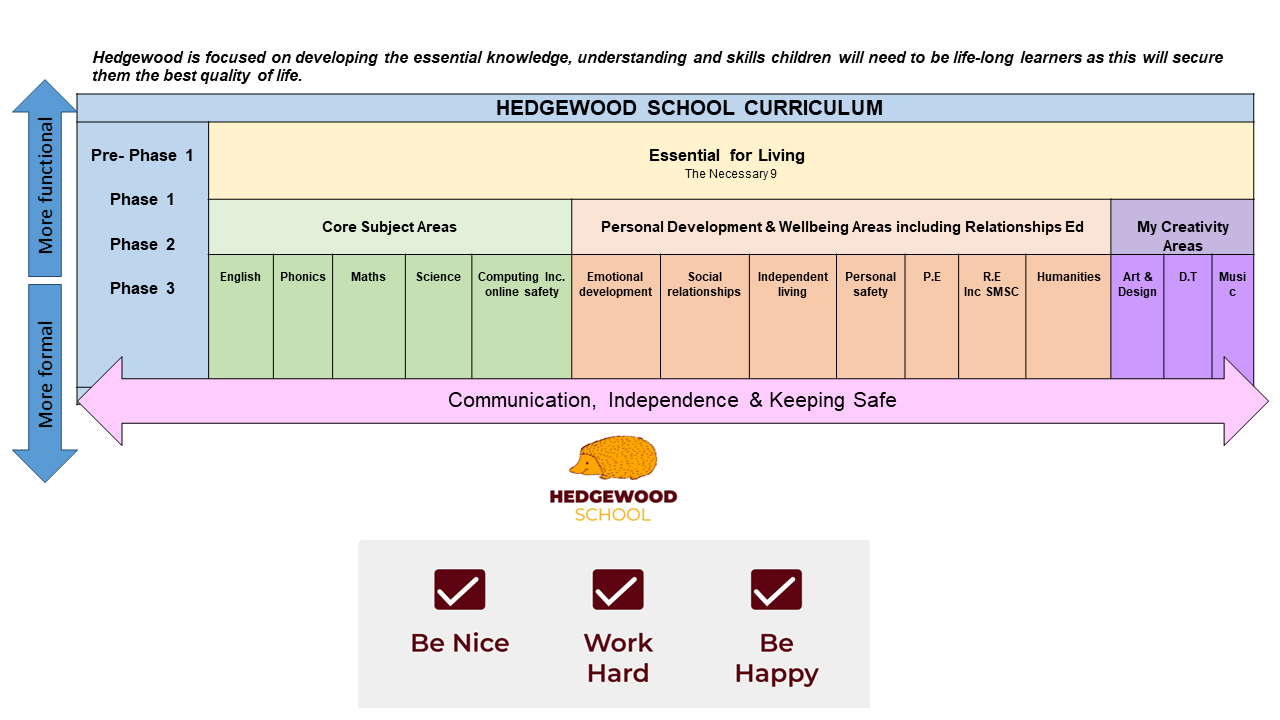Phase Overviews
At Hedgewood, we are dedicated to providing a curriculum that addresses the unique barriers to learning each of our pupils may face. We utilise a range of evidence-based tools tailored to different stages of a child's education to ensure a smooth transition from functional to formal learning. This approach simultaneously equips pupils with essential skills to enhance their academic performance. Our initial assessments place each pupil in one of three pathways, ranging from more functional learning to formal learning, based on their specific skill deficits. Regardless of the pathway, every pupil receives a Personalised Curriculum Plan (PLP) to serve as a mid-term strategy for addressing their unique needs and gaps in learning.
Pre-Phase 1
The Pre-Phase 1 pathway is designed for our most complex pupils, focusing on developing pertinent life skills that significantly improve their quality of life. We utilise the "Necessary 9 Skills" as outlined in Patrick McGreevy's Essential for Living curriculum. Given the challenges with generalisation, these skills are taught within functional contexts to enhance responsiveness and application, aiming for generalisation across different people, contexts, and settings. The end point for Pre-Phase 1 pupils is to score 3 or 4 on the Essential 8 quick assessment, indicating a foundational grasp of these life skills.
Phase 1
Pupils in Phase 1 are assessed using the VB-MAPP (Verbal Behaviour Milestones Assessment and Placement Program), which addresses common barriers to communication, attention and interaction. The curriculum during this phase is centred on an early core curriculum where pupils continue to develop generalisation skills through event-based teaching. This method allows pupils to apply their skills across various settings that align with their interests and motivations. Events in this phase are often general and frequently occurring in the child's life or involve activities and places that they regularly encounter, such as a garden centre or the seaside. The end point for Phase 1 is to complete 90% of the VB-MAPP assessment.
Phase 2
Phase 2 pupils transition to a curriculum structured around early concepts in the National Curriculum, while also addressing more academic barriers to learning. These barriers include challenges that impede their ability to engage in group discussions, expand their vocabulary, and work and play cooperatively with peers, using the ABLLS assessment criteria. This phase expands pupils' access to a broader curriculum that includes subject-specific learning and continued skill building. While maintaining a play-based learning environment, there are moments of increased targeted learning with the teacher. The end point for Phase 2 is to complete 90% of the ABLLS assessment, demonstrating their readiness to move forward with a more formalised and comprehensive learning experience.
Phase 3
Phase 3 pupils access an adapted National Curriculum that teaches subject-specific knowledge and addresses common learning misconceptions. They continue to overcome learning barriers using the Autism Progress framework, which also helps them develop social skills and emotional regulation.

